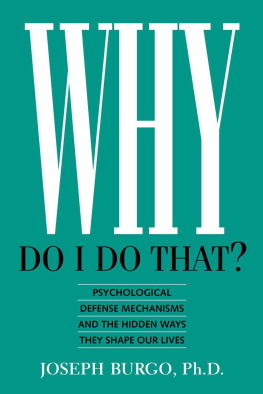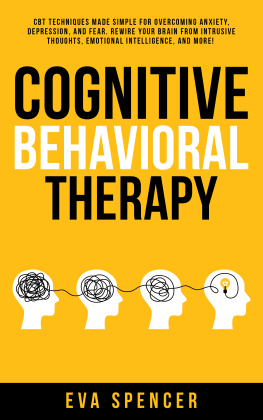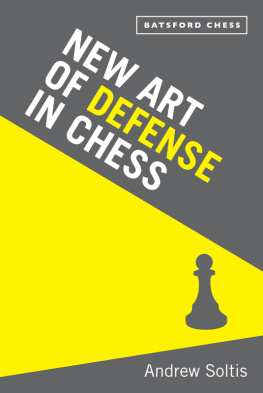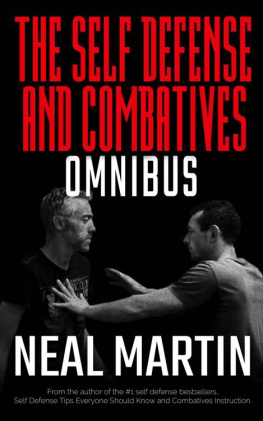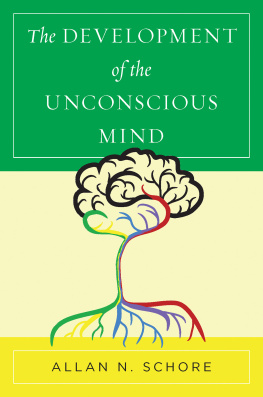JOS E P H B U R GO, P h . D .
Introduction
I began my training as a psychotherapist more than 30 years ago and Ive spent most of my career since then in private practice, working with adults who came to me because of unbearable anxiety or depression, unhappiness in their marriage, an eating disorder, shame or self-loathing, compulsive behavior for many different reasons but each one involving deep pain. This book represents my effort to distill that experience and what Ive learned into a useful guide for people who arent necessarily in therapy and may not be able to afford it.
I view human nature and psychology from a psychodynamic perspective : I believe that for each and every one of us, hidden aspects of our mental life remain outside of awareness and are thus unconscious . As a psychodynamic psychotherapist, my job is to acquaint clients with those unknown parts, and one of the primary ways I do this is by helping them to understand the psychological defense mechanisms that keep painful emotions, thoughts and fears outside of awareness.
Those defense mechanisms are the subject matter of this book: how they function, the painful elements of human experience they typically exclude from awareness, the reasons why we rely upon them and the potentially great benefits of acknowledging and facing the unconscious pain that lies behind them. Psychological defense mechanisms are a universal and necessary part of human psychology; they protect and help us to navigate the more difficult aspects of human experience, but often, they stand in the way of growth and satisfaction. Rigid or deeply entrenched defenses may prevent us from getting what we truly need in our relationships, from leading a rich emotional life and living in ways that promote authentic self-esteem. This book will help you recognize your own defense mechanisms at work and determine when you need to move beyond them in order to grow.
Although confronting pain may seem like a difficult chore, it can also be a liberating and exciting experience. What could be more fascinating than to probe your own depths, to recognize the rich psychological complexity of your friends, family members and acquaintances, to view human relationships with deeper understanding? After so many years in practice, I still love my work and find other people endlessly fascinating; I hope this book will impart some of that enthusiasm to you, as well.
My aim is to explain the central concepts and strategies of psychodynamic psychotherapy as I practice it, adapting them to a course of individual self-exploration outside of treatment. Why Do I Do That? begins by discussing the nature and purpose of psychological defense mechanisms, as well as those difficult aspects of the human experience that typically give rise to them (Part I). In the long middle section of the book (Part II), I take a closer look at the most important defense mechanisms, with exercises to help readers recognize their own defenses at work and identify unconscious feelings behind them. Part III concludes with several chapters that discuss ways to disarm those defenses and cope more effectively with our most difficult emotions.
In the coming pages, Ill spend a great deal of time discussing and helping readers become aware of pain which they may have a difficult time facing. The experience of reading this book, especially if you engage fully in the exercises, will be neither easy nor comfortable, but Im confident that if you persevere, youll see the benefits of greater self-awareness. Why Do I Do That? may help you to get more of what you need from your relationships, to develop a vivid but manageable emotional life, to know yourself better your strengths as well as your limitations and thus to develop realistic expectations for yourself that promote genuine self-esteem.
Just as clients in psychotherapy cant face the full extent of their pain all at once nobody could do that you probably wont be able to absorb all of the insights offered by this book in one go. You may need to read it more than once, or tackle a few chapters now and read the rest later, after youve had time to integrate what youve learned. Real growth occurs little by little, often over long periods of time. While its important to persevere and not turn away whenever you feel threatened, dont drive yourself too hard or expect more of yourself than you can manage. Each new bit of self-awareness, each step forward has its value.
Also bear in mind that nobody ever gets beyond his defense mechanisms and ceases to rely upon them. Although Im a therapist, the author of this book and your presumptive guide in this venture of self-exploration, I continue to confront and wrestle with my own defense mechanisms every day of my life. One of the primary messages of this book is that our sensitive emotional issues will continue to pose challenges for us throughout our lives, though with time and effort, we will navigate them more easily and with greater self-confidence.
In other words, the process of confronting pain and struggling with the often difficult memories associated with it is a challenge for everyone . As you work your way through the book and exercises, remember that in some larger sense, although it may not always be of immediate comfort, other people engaged in the same journey are struggling, too.
* * *
The psychodynamic perspective is rooted in the work of Sigmund Freud. As a young psychoanalyst, I used to teach a year-long course covering all 24 volumes of his work a standard part of the curriculum at most psychoanalytic training institutes throughout the world. Freud has fallen out of favor during the past 50 years, largely because he failed to understand female sexuality and held some views about women that today would be considered misogynistic or patronizing; hes widely considered obsolete and pass.
Despite this view, many of his revolutionary insights have been incorporated into our culture as basic assumptions. Even people who dismiss Freud often accept many of the core tenets of psychoanalysis without realizing it. Our culture has been profoundly and forever changed by his pioneering work.
Since Freud died in 1939, many influential theorists have extended and corrected his ideas. Ill be referring to some of them as I go along, but more often than not Ill be referring to Freud. By the end of this book, I hope youll have a deeper appreciation for his contribution to our culture, seeing in him, as I do, a revolutionary genius who helped shape the way we all think about ourselves and other people every day, even when we dont realize it.

